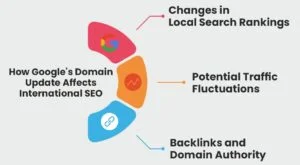Recently, Google made an announcement that all country-specific domains (such as Google.co.uk, Google.de, and Google.in) will now be redirecting their country code top-level domain names (ccTLD) versions to the primary Google.com domain. This shift in Google domain structure has raised many questions for SEO experts and businesses with a global online presence.
Let's explore how this change will affect international rankings in search, its potential impact on global search rankings, and actionable steps to ensure visibility in search engine results.
Understanding the Change in Google Domain Structure
Why is Google Implementing this Change?
While Google has not provided an official announcement specifying why this change is being made, business experts suggest the Google domain structure shift could:
- Simplified User Experience: Redirecting all searches to Google.com might result in a more unified search experience for everyone across the world.
- Centralized Data Tracking: One domain structure might enable Google to consolidate data tracking and enhance search algorithms.
- Reduction in Duplication of Content Issues: Country-specific domains sometimes display similar search results, leading to redundancy.
Google’s official statement explains, “Over the years, our ability to provide a local experience has improved. In 2017, we began providing the same experience with local results for everyone using Search, whether they were using google.com or their country’s ccTLD.”
What Domains Are Affected?
All localized versions are affected by this update, including:
- Google.co.uk (United Kingdom)
- Google.de (Germany)
- Google.fr (France)
- Google.in (India)
- Google.com.au (Australia)
Users searching these domains will now be redirected automatically to Google.com.
Impact on International SEO
With the Google domain structure update, localized keywords and geotargeting (like hreflang tags) will remain critical. For example, a site optimized for “Google.de” may need to adapt strategies for Google.com rankings.
1. Changes in Local Search Rankings
Earlier, companies optimized their sites for Google country-specific domains (e.g., Google.co.jp for Japan) to enhance local visibility. With this change, the dynamics of local SEO could be different.
Key Points to Consider:
- Localized Keywords: If Google.com becomes the primary search domain, will location-based searches continue to favor regional results?
- Geotargeting Signals: Websites need to support geotargeting using hreflang tags, localized content, and server location.
Example:
A German online shop ranking for “Kaufen Schuhe Berlin (buy shoes in Berlin)” on Google.de might have to rethink its tactics if searches now come from Google.com.
2. Potential Traffic Fluctuations
Websites that have depended on country-specific domains for natural traffic may see fluctuations in their search rankings.
Actions to Take:
- Monitor Google Search Console for traffic trends from different regions.
- Adjust keyword strategies based on new search patterns.
3. Backlinks and Domain Authority
Backlinks to country-level Google domains (such as a.edu website linking to Google.co.in) will be redirected to Google.com. Though this might not directly influence outside websites, tracking any referral traffic fluctuations is advisable.
Adapting Your SEO Strategy
With Google’s domain structure changes, businesses must refine their SEO approach to stay visible. Here's how to adapt and maintain strong search performance.
1. Strengthen Local SEO Efforts
Even with the change in Google domain structure change, local search intent remains critical. Businesses should:
- Optimize for region-specific keywords (e.g., “best hotels in Tokyo”).
- Maintain and update Google Business Profiles for physical locations.
- Build local citations and backlinks from reputable regional websites.
2. Implement Hreflang Tags Correctly
Hreflang tags help search engines understand which language and country a webpage targets. Proper usage ensures that the right version of a site is shown in search results. For example, an online shopping website with different pages for the US, UK, and Australia should use hreflang annotations to avoid duplicate content issues.
3. Monitor Search Performance Closely
- Google Analytics data for traffic trends.
- Search rankings for target keywords in different regions.
- Crawl errors in Google Search Console that may arise from the Google domain structure transition.
Future Outlook and Preparations
Google may improve its algorithms further, so staying proactive is important. Consider the following points:
Possible Algorithm Adjustments
Google may refine its ranking algorithms to accommodate this Google domain structure consolidation. Staying updated with official announcements from Google Search Central will be essential.
Long-Term SEO Best Practices
- Content Localization: Make your website content culturally and linguistically appropriate for target markets.
- Technical SEO Audits: Regularly check for technical issues like broken redirects or improper hreflang implementations.
- Voice Search Optimization: As voice searches tend to contain local intent (e.g., “near me” queries), conversational keyword optimization still matters.
Wrapping Up
Google’s move to redirect country domains to Google.com represents a profound change in its domain infrastructure. Although the complete effect on global SEO is still being developed, companies need to take active measures to adjust. Local SEO is still essential even with the Google domain structure shift. Correct application of hreflang tags and geotargeting signals will assist with search visibility. Ongoing traffic and ranking monitoring are required to detect and correct any disruption.
By remaining updated and making such changes, companies can follow this update successfully and maintain their international search presence.
For more insights, visit KnowledgeNile!
FAQ
1. Which domain is best for Google SEO?
Answer: A .com domain is the most trusted and widely recognized domain for Google SEO. If your audience is local, a country-specific domain (like .uk or .in) can also help.
2. Does country domain affect SEO?
Answer: Yes, a country domain (like .de or .ca) can boost local rankings but may limit global reach. Use it if you mainly target one country.
3. How to increase SEO on Google?
Answer: Focus on quality content, use relevant keywords, and get good backlinks. Also, make sure your site loads fast and is mobile-friendly.
You Might Like:
What is Google Rank Transition & What does it signify in SEO?






